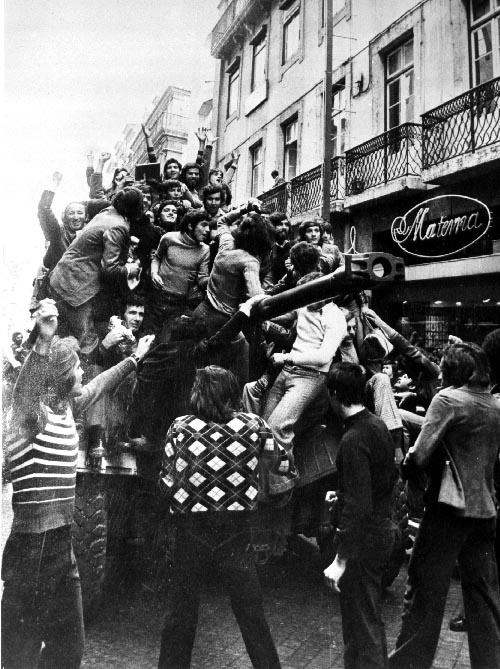
Carnation Revolution
The Carnation Revolution (Portuguese: Revolução dos Cravos), also known as the 25 April (Portuguese: 25 de Abril), was a military coup by left-leaning military officers that overthrew the authoritarian Estado Novo government on 25 April 1974 in Lisbon,[2] producing major social, economic, territorial, demographic, and political changes in Portugal and its overseas colonies through the Processo Revolucionário Em Curso. It resulted in the Portuguese transition to democracy and the end of the Portuguese Colonial War.[3]
Carnation Revolution
25 April 1974
- Political repression by the Estado Novo regime on civil liberties, the working class, political freedom, and freedom of speech
- Backlash against the Portuguese Colonial War, largescale conscription, massive military expenditures, and subsequent international isolation
- Poor leadership by Marcelo Caetano
Coup successful
- Dissolution of the Estado Novo
- Beginning of the Portuguese transition to democracy
- End of the Portuguese Colonial War and independence of Angola, Cape Verde, Guinea-Bissau, Mozambique, and São Tomé and Príncipe
- Indonesian invasion of East Timor
The revolution began as a coup organised by the Armed Forces Movement (Portuguese: Movimento das Forças Armadas, MFA), composed of military officers who opposed the regime, but it was soon coupled with an unanticipated popular civil resistance campaign. Negotiations with African independence movements began, and by the end of 1974, Portuguese troops were withdrawn from Portuguese Guinea, which became a UN member state as Guinea-Bissau. This was followed in 1975 by the independence of Cape Verde, Mozambique, São Tomé and Príncipe and Angola in Africa and the declaration of independence of East Timor in Southeast Asia. These events prompted a mass exodus of Portuguese citizens from Portugal's African territories (mostly from Angola and Mozambique), creating over a million Portuguese refugees – the retornados.[4][5]
The Carnation Revolution got its name from the fact that almost no shots were fired and from restaurant worker Celeste Caeiro offering carnations to the soldiers when the population took to the streets to celebrate the end of the dictatorship, with other demonstrators following suit and carnations placed in the muzzles of guns and on the soldiers' uniforms.[6] In Portugal, 25 April is a national holiday (Portuguese: Dia da Liberdade, Freedom Day) that commemorates the revolution.